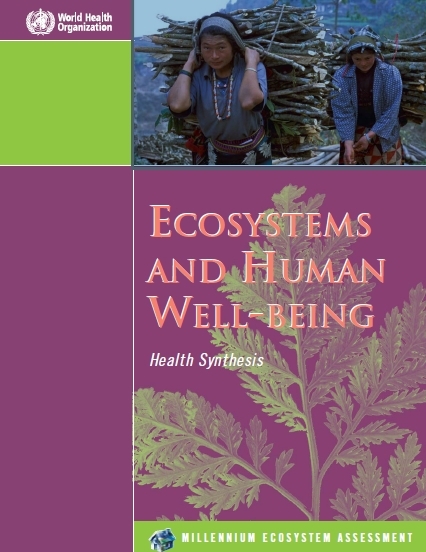Ecosystems and Human Well-being: Health Synthesis: Foreword
This is part of the Millenium Ecosystem Assessment report Ecosystems and Human Well-being: Health Synthesis.
Core Writing Team: Carlos Corvalan, Simon Hales, Anthony McMichael
Extended Writing Team: Colin Butler, Diarmid Campbell-Lendrum, Ulisses Confalonieri, Kerstin Leitner, Nancy Lewis, Jonathan Patz, Karen Polson, Joel Scheraga, Alistair Woodward, Maged Younes and many MA authors.
Review Editors: José Sarukhán and Anne Whyte (co-chairs); Philip Weinstein and other members of the MA Board of Review Editors.
It is becoming increasingly clear that population growth and economic development are leading to rapid changes in our global ecosystems. In recognition of this, the United Nations’ Secretary-General Kofi Annan, in a 2000 report to the General Assembly entitled: "We the Peoples: The Role of the United Nations in the 21st Century," called for the Millennium Ecosystem Assessment to be undertaken. Since 2001, the Millennium Ecosystem Assessment has worked to assess the consequences of ecosystem change for human well-being, and establish the scientific basis for actions needed to enhance the conservation and sustainable use of those systems, so that they can continue to supply the services that underpin all aspects of human life.
The assessment exercise has involved more than 1 300 experts worldwide. The findings provide the strongest evidence so far of the impact of our actions on the natural world. They show, for example, that over the past 50 years, humans have changed natural ecosystems more rapidly and extensively than in any comparable period in human history. This transformation of the planet has contributed to substantial net gains in human well-being and economic development. But not all regions and groups of people have benefited from this process, and many have been harmed. Moreover, the full costs associated with these gains are only now becoming apparent. Approximately 60% of the ecosystem "services" examined, from regulation of air quality to purification of water, are being degraded or used unsustainably.
Nature's goods and services are the ultimate foundations of life and health, even though in modern societies this fundamental dependency may be indirect, displaced in space and time, and therefore poorly recognized. These more distant and complex links mean that we now need to look at environmental health through a broader lens. Health risks are no longer merely a result of localized exposures to "traditional" forms of pollution – although these still certainly exist. They are also a result of broader pressures on ecosystems, from depletion and degradation of freshwater resources, to the impacts of global climate change on natural disasters and agricultural production. Like more traditional risks, the harmful effects of the degradation of ecosystem services are being borne disproportionately by the poor. However, unlike these more traditional hazards, the potential for unpleasant surprises, such as emergence and spread of new infectious diseases, is much greater.
This report represents a call to the health sector, not only to cure the diseases that result from environmental degradation, but also to ensure that the benefits that the natural environment provides to human health and well-being are preserved for future generations.
LEE Jong-wook
Director-General
World Health Organization
Terms of Use
The copyright for material on this page is the property of the World Health Organization. Click here for the Terms of Use (Ecosystems and Human Well-being: Health Synthesis: Foreword).
Disclaimer: This chapter is taken wholly from, or contains information that was originally written for the Millennium Ecosystem Assessment as published by the World Health Organization. The content has not been modified by the Encyclopedia of Earth.
|
|
